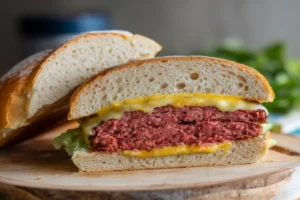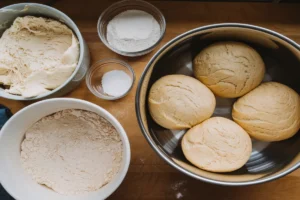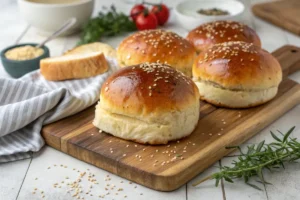Sourdough Hamburger Buns Recipe
Introduction
Making your own sourdough hamburger buns recipe is an exciting way to elevate any burger. These soft, flavorful, and slightly tangy buns are the perfect complement to a juicy patty, adding both texture and taste. In this sourdough hamburger buns recipe, we’ll show you how to make these delicious, homemade buns that hold up beautifully under any topping. Whether you’re an experienced baker or just starting out, you’ll find this recipe easy to follow and the results worth the effort.

Ultimate Sourdough Hamburger Bun Recipe
Why Sourdough for Hamburger Buns recipe?
Sourdough might not be the first thing that comes to mind when you think of hamburger buns, but it should be! The beauty of using sourdough starter for hamburger buns lies in its complexity of flavor, which adds a subtle tanginess that regular buns simply can’t match. This slight sourness isn’t overpowering but rather enhances the overall flavor profile, making every bite a more satisfying experience.
Aside from flavor, sourdough also contributes to a unique texture. The natural fermentation process in sourdough leads to a softer crumb and a slightly chewy texture, perfect for holding up against juicy patties and melted cheese. Moreover, sourdough buns tend to stay fresher longer due to the organic acids produced during fermentation, making them a great option for meal prepping or picnics.
Additionally, sourdough’s digestibility is another huge bonus. The long fermentation process helps break down gluten and phytic acid, which means these buns are gentler on the stomach. In short, sourdough offers a more flavorful, healthier, and longer-lasting alternative to traditional burger buns.
What Makes Sourdough Hamburger Buns Recipe Special?
What sets this sourdough hamburger bun recipe apart is the perfect balance of softness and structure. Some homemade buns are too soft and fall apart easily. This recipe combines softness with durability. The buns are pillowy yet strong enough to hold even the messiest burgers. Using sourdough starter elevates the flavor. It also creates a tender texture that is sturdy enough for all your favorite fillings.
Moreover, this recipe is incredibly customizable. Whether you prefer your buns plain, with sesame seeds, or brushed with a golden egg wash for an extra shine, you can adjust it to your taste. If you like, you can even make smaller buns for sliders or larger ones to accommodate double patties. The dough is versatile, and you can experiment to make it uniquely yours.
Unlike store-bought buns, these are made with love and the finest ingredients. With the right tools and a little patience, you can bake the ultimate sourdough hamburger buns that’ll have your guests asking for the recipe. It’s the kind of recipe that makes every burger feel like a gourmet meal.
Baking and Cooling
How to Bake Sourdough Hamburger Buns recipe
Once you’ve shaped your sourdough hamburger buns and they’ve gone through their final rise, it’s time to bake them to golden perfection. The baking process is crucial to achieving a beautiful, soft, and well-cooked bun with the right texture.
Baking Temperature and Time
For the ideal sourdough hamburger bun, you’ll want to bake your buns at a temperature between 350°F and 375°F (175°C to 190°C). This range provides the perfect balance between achieving a crisp, golden-brown crust and cooking the dough all the way through without overbaking.
Baking time will vary slightly depending on the size of your buns, but generally, you should bake them for 20 to 25 minutes. Keep an eye on the buns as they bake. They should turn a lovely golden brown and feel firm to the touch. The internal temperature of the buns should reach around 190°F (88°C) for a fully cooked interior.
Checking for Doneness Sourdough Hamburger Buns
To ensure your sourdough hamburger buns are fully baked, it’s best to use a few simple tests. First, visually check the color; they should have a warm, golden-brown hue. If you gently tap the bottom of a bun, it should produce a hollow sound, indicating that it’s properly cooked.
Iyou can always use a thermometer to check the internal temperature. If it reads 190°F (88°C) or higher, your buns are perfectly done. However, if the tops are golden but the centers still feel doughy, let them bake for a few more minutes and test again.
Cooling and Storing the Buns
After baking, the next step is to cool the buns properly. Cooling is essential to allow the structure of the bun to set and prevent it from becoming soggy when sliced.
Cooling Process
Once you remove the buns from the oven, place them on a wire rack to cool. This allows air to circulate around the buns, helping them cool evenly. Be sure to let them cool completely before slicing. If you cut them while they’re still hot, the interior can become compressed, and you risk squishing them, resulting in a less-than-perfect bun.
It’s best to wait at least 30 minutes before slicing into them. This gives the crumb a chance to firm up and improves the texture of the final product.
Storing and Freezing
If you don’t plan on using the buns immediately, you can store them at room temperature in an airtight container for up to 2 days. To keep them fresh for longer, wrap them tightly in plastic wrap or a resealable bag and store them in the freezer for up to 3 months.
When you’re ready to use them, simply remove the buns from the freezer and let them thaw at room temperature, or you can pop them in the oven for a few minutes to warm them up and restore some of that fresh-baked crispness.
Variations and Tips
Customizing Your Sourdough burger bun recipe
One of the best parts about making your own sourdough hamburger buns is the freedom to customize them to suit your tastes. Here are a few ideas for making them even more unique and tailored to your preferences.
Adding Flavors and Toppings
To take your sourdough hamburger buns to the next level, consider incorporating different flavors or toppings into the dough. You can add herbs like rosemary or thyme for a savory touch, or sprinkle in some cheese such as cheddar or parmesan for a cheesy burst. If you want a more flavorful bun, try adding garlic powder, onion powder, or even a pinch of paprika to the dough to infuse extra layers of taste.
For a fun texture and visual appeal, you can also top your buns with sesame seeds, poppy seeds, or sunflower seeds before baking. A light brush of an egg wash will give them a shiny finish and make them even more appetizing!
Gluten-Free and Vegan Adaptations
If you follow a gluten-free or vegan diet, you can still enjoy these delicious sourdough hamburger buns. For a gluten-free version, replace the regular flour with a high-quality gluten-free flour blend. Make sure to add a binder like xanthan gum to help with the texture. Additionally, you can replace the sourdough starter with a gluten-free sourdough starter.
To make the recipe vegan, simply substitute the butter with plant-based butter or olive oil, and replace the egg with a flax egg or another egg substitute. As for the milk, you can use almond or oat milk for a dairy-free option. These substitutions allow you to enjoy the same soft, flavorful buns, no matter your dietary needs.
Troubleshooting Common Issues
Even the most experienced bakers encounter a few hurdles along the way. If you find yourself facing some issues with your sourdough hamburger buns, here are some common problems and how to fix them.
Buns Too Dense?
If your sourdough hamburger buns turn out too dense or heavy, the issue is likely related to the dough’s rise. Make sure you’re allowing enough time for both rises: the first rise should take about 1-2 hours, and the second rise should be around 45 minutes.
If your buns are still dense, you might need to give the dough more time to ferment and develop a better structure. Another factor could be under-kneading—ensure you’re kneading the dough long enough to activate the gluten, which helps with the lightness.
Buns Too Flat?
Flat buns can be a result of not letting the dough rise enough, or perhaps the yeast didn’t activate properly. If your buns are flat, ensure your yeast is fresh and active. Additionally, make sure the dough is in a warm, draft-free area while it rises. If the dough doesn’t double in size during the first rise, it could be a sign that it wasn’t given enough time or heat.
FAQ: Sourdough Hamburger Buns Recipe
1. What are Sourdough Hamburger Bun Recipe with Yeast?
Making your own bread is really something special, isn’t it? And if you are a burger enthusiast, then homemade sourdough hamburger buns are absolutely essential to take your burgers from ordinary to extraordinary. However, achieving that perfect balance of soft texture and tangy flavor can be tricky. It’s about more than just slapping together some dough; it’s an art, a science, and a lot of love. So, what’s the key?
2. What is the secret to sourdough?
The secret to sourdough lies in the use of a natural starter, which is a mixture of flour and water that ferments over time, capturing wild yeast and bacteria from the environment. This fermentation process creates the characteristic tangy flavor and chewy texture that make sourdough bread and buns so unique. Patience and care in feeding and maintaining your starter are key to success.
3. What’s the difference between bread and hamburger buns?
The main difference between bread and hamburger buns is texture and shape.Bread is often denser and larger. Hamburger buns, on the other hand, are softer, lighter, and shaped in smaller, round portions to fit a burger patty. They are slightly sweeter and have a tender crumb, making them perfect for holding juicy fillings. Regular bread is usually more substantial and versatile for other uses.
How make Egg White Burger Buns recipe?
Egg White Burger Buns are fluffy, low-carb, and gluten-free buns made with simple ingredients like egg whites and cream of tartar. They’re perfect for healthy, protein-packed burgers or sandwiches.
Conclusion: Enjoy Your Sourdough Hamburger Buns Recipe
Making your own sourdough hamburger buns is more than just creating something delicious. It’s about enjoying the process and savoring the result. There’s something satisfying about biting into a burger made with homemade buns. You crafted them yourself, achieving the perfect balance of flavor, texture, and freshness. These buns offer the right mix of softness and sturdiness to hold your favorite fillings. Plus, they bring the irresistible tangy sourdough flavor.
By choosing to bake your own buns, you have full control over every ingredient and step, allowing you to create a burger experience that’s uniquely yours. Plus, once you’ve mastered the basics of this sourdough hamburger bun recipe, the possibilities for customization are endless. Experiment with herbs, spices, or even cheese to create your signature bun. Try different rise times or even tweak the dough’s hydration level to see how it affects the final texture.
Whether you’re a beginner or an experienced baker, this recipe is a fantastic way to elevate your burger night, impress guests, or enjoy a homemade meal with a personal touch. So, enjoy the rewarding process of making your ultimate sourdough hamburger buns. The result will not only delight your taste buds but also make you proud of your baking skills. Happy baking!
Print
Sourdough Hamburger Buns Recipe
- Total Time: 5 hour 45 minutes to 10 hour 55 minutes (depending on rise time)
- Yield: 8-10 hamburger buns
- Diet: Vegetarian
Description
These Sourdough Hamburger Buns are a delicious step up from your average store-bought buns. They boast the tangy flavor of sourdough, a chewy yet tender crumb, and a beautiful, golden crust. Perfect for grilling season, these buns can handle juicy burgers and all your favorite toppings. While sourdough baking can have a learning curve, this recipe is designed to be approachable and rewarding, offering a wonderful homemade experience.
Ingredients
-
Sourdough Starter:
-
1/2 cup (113g) active, bubbly sourdough starter (100% hydration)
-
-
Flour:
-
3 1/2 cups (420g) all-purpose flour or bread flour, plus more for dusting
-
-
Water:
-
1 cup (240ml) lukewarm water
-
-
Milk:
-
1/4 cup (60ml) lukewarm milk (can also use water)
-
-
Fat:
-
1/4 cup (60g) unsalted butter, melted and slightly cooled (or olive oil for a softer crust)
-
-
Sweetener:
-
2 tablespoons granulated sugar (or honey, or maple syrup)
-
-
Salt:
-
1 1/2 teaspoons fine sea salt
-
-
Egg Wash:
-
1 large egg, beaten with 1 tablespoon of water or milk (optional, for shine and browning)
-
-
Optional Toppings:
-
Sesame seeds, poppy seeds, or everything bagel seasoning
-
Instructions
-
Combine Starter and Water: In a large mixing bowl, combine the active sourdough starter and lukewarm water. Mix well until the starter is well distributed.
-
Add Flour, Milk, Fat, Sweetener, and Salt: Add the flour, milk, melted butter (or olive oil), sugar (or honey, maple syrup), and salt to the bowl.
-
Mix the Dough: Mix the ingredients together until a shaggy dough forms, making sure that there are no streaks of flour remaining.
-
Knead the Dough: Turn the dough out onto a lightly floured surface and knead for 8-10 minutes, until it is smooth and elastic. The dough may feel slightly sticky, but should come together into a ball. If the dough is very sticky, add 1 tablespoon of flour at a time until manageable.
-
First Rise (Bulk Fermentation): Place the dough into a lightly oiled bowl, turning to coat. Cover with plastic wrap or a damp towel and let it rise in a warm place for 4-8 hours, or until it has increased by about 50-75% . The time will depend on the strength of the starter and ambient temperature.
-
Divide the Dough: Gently turn the dough out onto a lightly floured surface. Divide the dough into 8-10 equal portions.
-
Shape the Buns: Gently shape each portion into a round ball, pinching the bottom to form a taught, smooth surface on top.
-
Second Rise (Proofing): Place the shaped dough balls on a baking sheet lined with parchment paper. Allow room for expansion between the buns. Cover with plastic wrap or a damp towel and let them proof for 1-2 hours, or until they have nearly doubled in size.
-
Preheat the Oven: Preheat your oven to 375°F (190°C). Place an oven-safe pan on the bottom rack of the oven to create steam.
-
Egg Wash and Toppings (Optional): Gently brush the tops of the buns with the egg wash, if using. Sprinkle with sesame seeds, poppy seeds, or everything bagel seasoning, if desired.
-
Bake: Add about 1 cup of water to the preheated pan on the bottom shelf to create steam. Then, bake the buns in the preheated oven for 20-25 minutes, or until they are golden brown and sound hollow when tapped on the bottom.
-
Cool: Remove the buns from the oven and let them cool on a wire rack completely before slicing and serving.
Notes
-
Sourdough Starter: It is essential to use an active and bubbly starter for best results. If your starter is not reliably active you may need to make adjustments.
-
Flour: You can use either all-purpose flour or bread flour, but bread flour will result in a slightly chewier bun.
-
Kneading: It’s important to knead the dough well to develop the gluten, which will give you the desired structure and texture.
-
Bulk Fermentation: The first rise time can vary based on your environment. Look for the dough to increase by 50-75% and be puffy.
-
Proofing: Don’t skip the second proof, it’s important for a light and airy crumb.
-
Steam: Creating steam in the oven is essential for a good crust on sourdough breads. You can also use a spray bottle to spritz the buns with water a few times during baking.
-
Toppings: Have fun experimenting with different toppings.
-
Storage: Once fully cooled, store in an airtight container for 3-4 days at room temperature, or in the freezer for a longer period. Thaw and warm gently before serving.
- Prep Time: 20-30 minutes
- Cook Time: 20-25 minutes
- Category: Bread, Baking
- Method: Baking
- Cuisine: American, Artisan Bread
Nutrition
- Serving Size: 1 bun
- Calories: 250-300
- Sugar: 4-6 grams
- Sodium: 300-400 mg
- Fat: 8-10 grams
- Saturated Fat: 4-6 grams
- Unsaturated Fat: 3-5 grams
- Trans Fat: 0 grams
- Carbohydrates: 40-50 grams
- Fiber: 2-3 grams
- Protein: 8-10 grams
- Cholesterol: 30-40 mg (if egg wash is used)
Keywords: Sourdough Buns, Hamburger Buns, Homemade Buns, Sourdough Recipe, Baking, Bread Recipe, Artisan Bread, Easy Sourdough, Grill Bread, Burger Buns, Sourdough Bread



